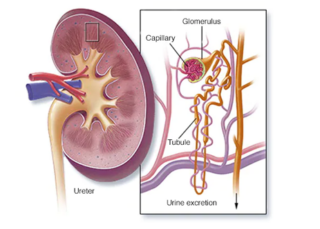What is the treatment for acute kidney injury?
Acute kidney injury (AKI) is a sudden episode of kidney failure or kidney damage that happens within a few hours or a few days. AKI causes a build-up of waste products in your blood and makes it hard for your kidneys to keep the right balance of fluid in your body. AKI can also affect other organs such as the brain, heart, and lungs. Acute kidney injury is common in patients who are in the hospital, in intensive care units, and especially in older adults. What are the signs and symptoms of acute kidney injury? Signs and symptoms of acute kidney injury differ depending on the cause and may include: Too little urine leaving the body Swelling in legs, ankles, and around the eyes Fatigue or tiredness Shortness of breath Confusion Nausea Seizures or coma in severe cases Chest pain or pressure In some cases, AKI causes no symptoms and is only found through other tests done by your healthcare provider. What causes acute kidney injury? Acute kidney injury can have many different causes. AKI can be caused by the following: Decreased blood flow Some diseases and conditions can slow blood flow to your kidneys and cause AKI. These diseases and conditions include: Low blood pressure (called “hypotension”) or shock Blood or fluid loss (such as bleeding, or severe diarrhoea) Heart attack, heart failure, and other conditions leading to decreased heart function Organ failure (e.g., heart, liver). In conclusion, the treatment of acute kidney injury treatment (AKI) at Swanand Kidney Clinic is focused on addressing the underlying causes and providing comprehensive care to support kidney recovery. 👉Visit Here For More Info: 👉 https://swanandkidneyclinic.com/acute-kidney-injury/ 
Acute Kidney Failure Treatment?
**Acute kidney injury (AKI)** is a sudden decline in the ability of your kidneys to work and perform their normal functions. AKI is sometimes called acute kidney failure or acute renal failure. AKI is very serious and needs to be treated right away to prevent lasting kidney damage. If AKI is treated early, most people will return to their previous kidney function. If you were healthy before AKI and you get treated right away, your kidneys could work normally or almost normally after treatment. AKI can sometimes lead to chronic kidney disease (CKD). This usually happens if the AKI causes severe damage to the kidneys. In time, CKD can cause your kidneys to stop working altogether. This is known as kidney failure, end-stage renal disease (ESRD) or end-stage kidney disease (ESKD). **Who has a higher chance of getting AKI?** Acute kidney injury (AKI) is a sudden decline in the ability of your kidneys to work and perform their normal functions. AKI is sometimes called acute kidney failure or acute renal failure. AKI is very serious and needs to be treated right away to prevent lasting kidney damage. If AKI is treated early, most people will return to their previous kidney function. If you were healthy before AKI and you get treated right away, your kidneys could work normally or almost normally after treatment. AKI can sometimes lead to chronic kidney disease (CKD). This usually happens if the AKI causes severe damage to the kidneys. In time, CKD can cause your kidneys to stop working altogether. This is known as kidney failure, end-stage renal disease (ESRD) or end-stage kidney disease (ESKD). **Who has a higher chance of getting AKI?** People who are sick and in the hospital have a higher chance of AKI. People who are in the intensive care unit (ICU) are even more likely to have AKI. You have a higher chance of AKI if you: Just had bypass (or other major) surgery Were in the hospital for COVID-19 (coronavirus) Are age 65 or older Have heart disease, congestive heart failure or COPD (chronic obstructive pulmonary disease) Have a history of kidney disease Have severe, uncontrolled high blood pressure. Take insulin for diabetes. Have peripheral artery disease (a condition that makes it hard for your blood to get to your arms and legs) Are severely dehydrated or unable to keep fluids in your body. **What are the symptoms of AKI?** In milder forms of AKI, there may not be any signs or symptoms and your doctor may find it when doing tests to look for other things. In more severe forms of AKI, signs and symptoms may include: Urinating (peeing) less often Swelling in your legs, ankles or feet Feeling weak and tired Feeling like you cannot catch your breath Feeling confused Feeling sick to your stomach Feeling pain or pressure in your chest Seizures or coma (in severe cases of AKI) Swanand Kidney Clinic specializes in the [acute kidney failure treatment in Pune](https://swanandkidneyclinic.com/acute-kidney-injury/). Our team of experienced nephrologists provides comprehensive care using advanced diagnostic tests and personalized treatment plans. 

